

Saying No in German - How to Say No in German. Even people who don't study German know that Nein means no in German.
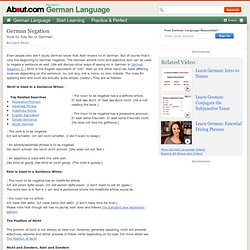
But of course that's only the beginning to German negation. The German adverb nicht and adjective kein can be used to negate a sentence as well. (We will discuss other ways of saying no in German in German Negation II.) Nicht is the English equivalent of "not". Kein on the other hand can have differing nuances depending on the sentence: no, not any, not a, none, no one, nobody.
Nicht is Used in a Sentence When: - The noun to be negated has a a definite article.Er liest das Buch. . - The noun to be negated has a possessive pronoun.Er liebt seine Freundin. . - The verb is to be negated.Ich will schlafen. . - An adverb/adverbial phrase is to be negated.Sie rennt schnell. . - An adjective is used with the verb sein.Das Kind ist geizig. Kein is Used in a Sentence When: - The noun to be negated has an indefinite article.Ich will einen Apfel essen.
. - the noun has no article.Ich habe Zeit dafür. The Position of Nicht. German Gender Hints - Noun Gender - DAS. You are here: Gender Hints Intro > DER > DIE > DAS > Quiz 1 > Quiz 2 RULE NO. 1: When learning a German noun, always treat its article as an integral part of the word!
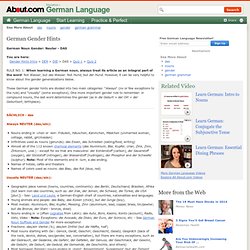
Not Wasser, but das Wasser. German Noun Suffixes and Gender. Predicting German Noun Gender Introduction Learning the gender of German nouns can be a problem for English-speakers.
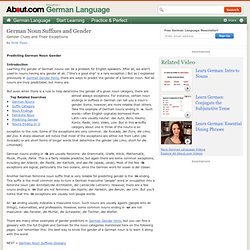
After all, we aren't used to nouns having any gender at all. ("She's a good ship" is a rare exception.) But as I explained previously in German Gender Hints, there are ways to predict the gender of a German noun. Not all nouns are truly predictable, but many are. But even when there is a rule to help determine the gender of a given noun category, there are almost always exceptions. German nouns ending in -ik are usually feminine: die Grammatik, Grafik, Klinik, Mathematik, Musik, Physik, Panik. Another German feminine noun suffix that is very reliable for predicting gender is the -in ending. An -er ending usually indicates a masculine noun.
There are many other examples of gender predictors in German Gender Hints, but you can find a glossary with the full English and German for the noun categories mentioned here on the following pages. German Gender Hints - Noun Gender in German. Nouns and Gender in German You are here: German for Beginners > Lesson 3 > Gender Hints > Noun Suffixes Most world languages have nouns that are either masculine or feminine.
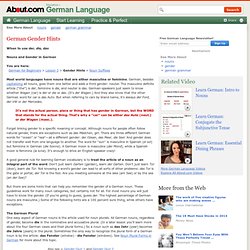
German, besides capitalizing all nouns, goes them one better and adds a third gender: neuter. The masculine definite article (“the”) is der, feminine is die, and neuter is das.
Adj-Syntax. Prepositions. Pronouns. Articles. German Grammar by Topic - Grammatik - German Lessons. Grammatik: A German Grammar Guide Grammar Lessons and References by Topic Learn German grammar!
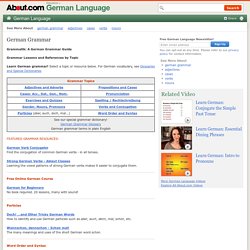
Select a topic or resource below. For German vocabulary, see Glossaries and Special Dictionaries German Verb Conjugator Find the conjugation of common German verbs - in all tenses. Strong German Verbs - Ablaut Classes Learning the vowel patterns of strong German verbs makes it easier to conjugate them. Free Online German Course German for Beginners No book required. 20 lessons, many with sound! Particles Doch! Wennschon, dennschon - Schon mal! Word Order and Syntax German Word Order 1 A helpful guide to German syntax. German Word Order 2 A helpful guide to German syntax, Part 2.